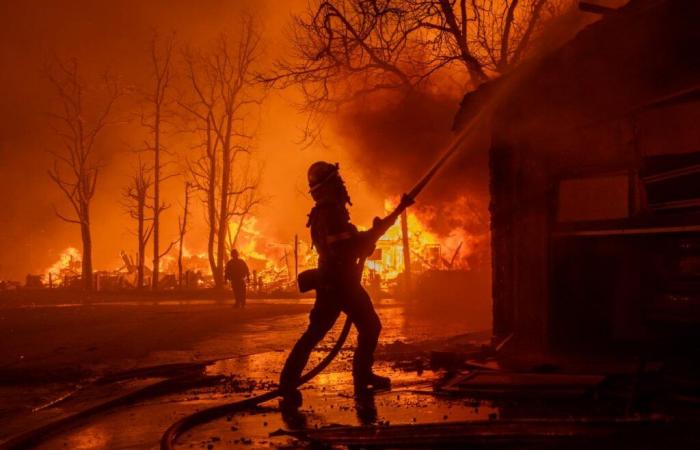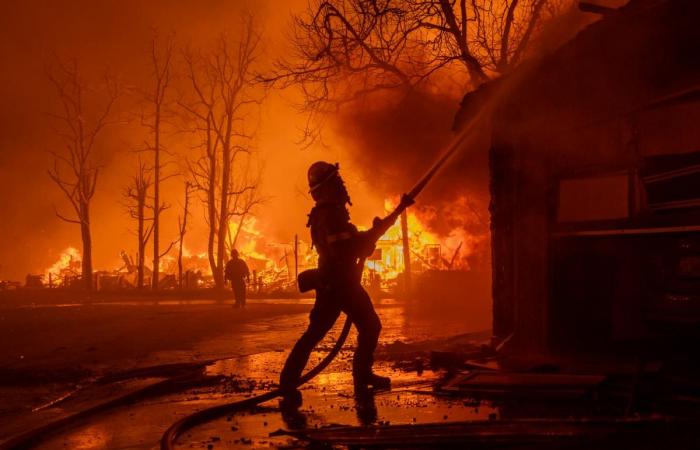In his climatic and political dystopia “The Flood”, released in 2024, the American writer described a devastating conflagration in the City of Angels. A fiction with disturbing similarities with current events, which he returns to for “Télérama”.
January 7, 2025 in Pasadena. Photo David McNew/Getty Images
By Yoann Labroux Satabin
Published on January 15, 2025 at 1:30 p.m.
HAS reading the Flood, fascinating climatic and political dystopia which has established itself as one of the great American novels of the year 2024, we suspected that it would be exciting to reopen this bubbling thousand-page novel in ten years. Little did we imagine that it would only take a few months to find an entire chapter live on all the news channels. Since January 7, 2025 and the start of the violent fires encircling Los Angeles, the same images everywhere: orange embers filling the sky, charred lawns, hasty departures of residents who leave a life behind them… A carbon copy of what told a chapter of Flood, in which the City of Angels found itself consumed by flames in 2031. While approximately 88,000 residents of Los Angeles County were subject to an evacuation order this Tuesday, January 14, we spoke by video with its author, Stephen Markley. Residing in the center of the city, near the Downtown Los Angeles district, it is not directly threatened by the multiple fires in progress. But like all Angelenos, he knows people who have lost everything in recent days. And worries more than ever about the future.
How did you feel when you discovered the fire?
Writing this book, and this chapter in particular, made me realize how vulnerable Los Angeles is to wildfires. Since 2017, I have therefore been very sensitive to the idea that such an event could happen. I was jogging the day it started and I felt the winds were very strong. It looked bad. Add to that the fact that it’s the rainy season and we haven’t had a drop… When the Palisades fire started, I was like, “That’s the book.” This is what I wrote. »
How did the idea come about to devote an entire chapter of your novel to a fire in the middle of Los Angeles?
The mission of this chapter was to show what the climate crisis is. Put the reader face to face with the consequences of this, making them as brutal as they are realistic. Show that it is not an act of God but something that is done to us. I was already living in Los Angeles, where there is this annual ritual around the fear of fires. From there came the idea to do in-depth research into what would happen if a wildfire really got out of control in the city. Those who have read the novel know that what is happening now is not the worst-case scenario. I would like to make people understand that this is only the beginning. This may not even be the most destructive fire that will occur in the next fifteen or twenty years.
Also read:
Fires in Los Angeles: “The landscapes of California have been largely transformed by man”
You’ve done a lot of research to credibly integrate this element into your story…
And this research led to this exact scenario. Note that over the past two years, California has experienced record rainfall, which has caused a large number of plants to grow. Then there’s what’s called climate whiplash, where the climate suddenly dries up. All this vegetation dries up and suddenly the winds pick up. The slightest spark will ignite and, carried by the wind, spread very quickly. What’s different about my novel is that we were lucky that the fire didn’t spread to the denser center. There was the Sunset one, which I could see from my window, but fortunately it did not meet the other lights. It’s strange and unsettling to think about this for so long and see it come to life.
The climate crisis overlaps with social inequalities and these problems obviously feed into each other.
Did you have to interact with different experts?
Yes, but above all I read a lot. The most frustrating thing about the climate crisis is that all this information is available, and in a very accessible way.
You mention, in the novel, the inequalities which do not fail to resurface in such a situation, which has also been the case since January 7…
Some wealthier people were able to use a private fire department to protect their homes. But that’s been the case for years in Los Angeles. The climate crisis overlaps with social inequalities and these problems obviously feed into each other. Think about the consequences in terms of housing, already a nightmare here. Suddenly, thousands of homes are being removed from the housing stock. It will take a long time to rebuild and housing prices will be affected. But the elephant in the room that no one wants to talk about is the insurance market. California is already fighting to keep insurance companies, wary of the risk of fires, in the state. If you can no longer afford the most important asset in your life, especially in states where home ownership serves as a pension, that’s a huge problem. This is how my novel ends, with this insurance crisis metastasizing into a broader financial crisis.
Also read:
Fires in Los Angeles: which important cultural places are affected?
How do you think California – and, beyond that, the entire country – will respond to this disaster?
There is no other choice but to rebuild, the housing situation is so tense. One of California’s big problems is that much of its land is zoned for single-family housing. The kind of attitude we call Nimby [« Not in my backyard », « pas dans mon jardin », ndlr] keeps housing stock artificially low, making it incredibly expensive. This event should encourage us to defend the Inflation Reduction Act [programme massif de subventions à la transition énergétique lancé par l’administration Biden en 2022, ndlr]which Trump and the Republicans want to dismantle.
The mainstream media is reluctant to link an event like the Los Angeles fires to climate change.
But many people don’t make the connection with global warming…
This is largely because of the way the media presents these events to the public. The mainstream media is reluctant to link an event like the Los Angeles fires to climate change. By reflex, they first talk about the human tragedy, the staggering losses… without ever uttering the words “climate crisis”. While every news story should start with this sentence: “This is what climate change looks like. » If we don’t try to prevent an even worse outcome in the future, we are doing a disservice to all those affected.
In your novel, the mayor has this memorable sentence: “We will rebuild so that Hollywood can immortalize this story. »
I think Hollywood has so far failed to create climate stories. Yet this is what we need to do so that people understand emotionally – and not just intellectually – the issues of the climate crisis. This is what I know how to do, and what I am going to tackle.







